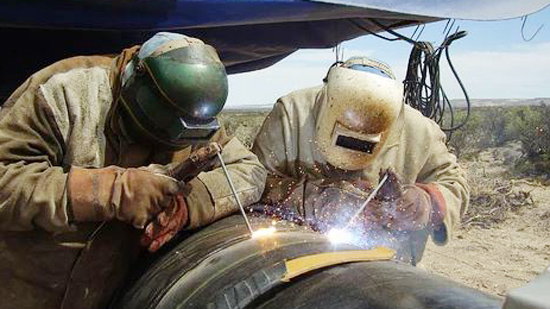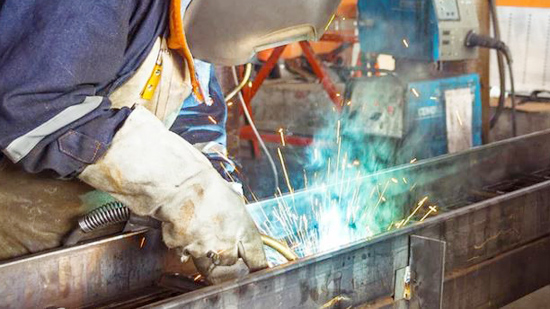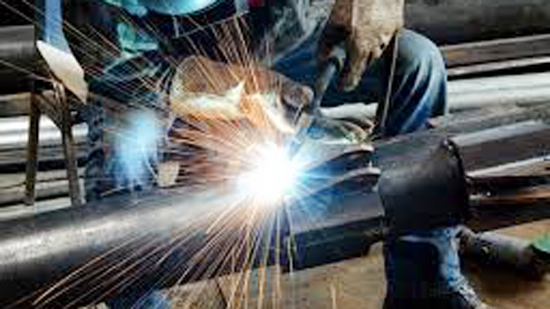Pipeline welders typically earn between $20 to $40 per hour, depending on experience and location. Welders with specialized skills or certifications may command higher pay rates. The hourly wage for pipeline welders reflects the demanding nature of the job, requiring precision and expertise to ensure the integrity and safety of the pipelines they work on.
Additionally, factors such as project complexity, welding technique, and the specific industry can also influence the hourly rate of pipeline welders. In this competitive field, experienced and skilled pipeline welders are valued for their ability to deliver high-quality work efficiently and safely.

Image by primeweld
About Pipeline Welding
When it comes to the construction of pipelines, one of the most crucial roles is that of a pipeline welder. These skilled professionals are responsible for joining sections of pipes together by welding them, ensuring a strong and secure connection. The role of a pipeline welder requires a high level of expertise and precision, as any flaws in the welds can lead to leaks or structural weaknesses in the pipeline.
Pipeline welders work in various industries, including oil and gas, water and sewage, and construction. They may be employed by pipeline construction companies, contractors, or even work as independent contractors themselves. Regardless of the specific industry or employer, pipeline welders play a vital role in ensuring the integrity and safety of the pipelines they work on.
To excel as a pipeline welder, certain key skills and qualifications are essential. Here are some of the most important ones:
1. Welding Expertise
A pipeline welder must possess a high level of welding expertise. They need to be proficient in various welding techniques, such as shielded metal arc welding (SMAW), gas metal arc welding (GMAW), and flux-cored arc welding (FCAW). They should be able to accurately read and interpret welding blueprints and specifications.
Knowledge Of Materials And Codes
Understanding different types of metals and their properties is crucial for a pipeline welder. They must be knowledgeable about the specific materials being used in the pipeline construction and adhere to relevant codes and standards, such as those set by the American Welding Society (AWS).
3. Safety Consciousness
Pipeline welding involves working with high temperatures, hazardous materials, and potentially dangerous environments. A pipeline welder must prioritize safety and follow strict safety protocols to prevent accidents or injuries. They should be well-versed in safety practices, including the use of personal protective equipment (PPE).
4. Physical Fitness
Pipeline welding can be physically demanding, requiring individuals to work in confined spaces, at heights, or in adverse weather conditions. Good physical fitness and stamina are important to perform the tasks efficiently and safely.
5. Certification And Training
Obtaining relevant certifications and completing specialized training programs is often necessary to become a pipeline welder. Certifications like the Certified Welding Inspector (CWI) or Certified Welding Educator (CWE) can enhance career prospects and demonstrate a high level of expertise.
Pipeline welding is a challenging and rewarding profession that demands a unique skill set and a commitment to safety and quality. With the right qualifications and experience, pipeline welders can enjoy a fulfilling career in the construction industry.
Understanding Pipeline Welder Earnings
Factors Influencing Hourly Pay
Several factors impact the hourly pay of pipeline welders. The level of experience, certification, and the complexity of the project all play a role in determining their earnings. The location of the work site and the demand for skilled welders in that area can significantly affect the hourly wage.
Comparing Earnings Across Regions
When comparing earnings across regions, it’s essential to consider the cost of living in each area. Pipeline welders in regions with a higher cost of living may earn a higher hourly wage to offset these expenses, while those in regions with a lower cost of living may have a lower hourly rate but still maintain a comparable standard of living.
Average Hourly Rates For Pipeline Welders
Pipeline welders typically earn average hourly rates ranging from $25 to $35, depending on factors such as experience, location, and project complexity. Skilled and certified pipeline welders with extensive experience may command higher hourly rates, reflecting the demanding nature of their specialized work.
Entry-level Vs. Experienced Welders
Entry-level pipeline welders are those who are just starting their careers in the welding industry and may not have much experience. They usually earn lower wages compared to experienced welders. According to PayScale, the average hourly wage for an entry-level pipeline welder is around $20.50. However, with experience, their wages can increase significantly. Experienced pipeline welders who have been working in the industry for several years can earn much higher wages.
The more experience they have, the more in-demand their skills become, and the higher the hourly wage they can command. Experienced pipeline welders can earn an average hourly wage of around $35.50, according to PayScale.
Impact Of Certifications On Earnings
Pipeline welding certifications can have a significant impact on the average hourly wage earned by welders. Welders who hold certifications in specific welding techniques or materials can earn higher wages than those who do not hold certifications. Certifications can also be an indicator of a welder’s skill level and experience.
For instance, a pipeline welder who holds a certification in welding stainless steel can earn an average hourly wage of $29.92, while a welder who does not hold this certification earns an average hourly wage of $25.81, according to PayScale. Certifications can also lead to more job opportunities and higher-paying positions.
The hourly wage earned by pipeline welders can vary significantly depending on their experience level and certifications. Entry-level welders earn lower wages, while experienced welders can earn much higher wages. Certifications in specific welding techniques or materials can also impact the hourly wage earned by welders.
Top Paying States For Pipeline Welders
Discover the top paying states for pipeline welders and explore how much they make per hour. Uncover the lucrative opportunities in this specialized field and the earning potential for skilled professionals.
When it comes to the earning potential of pipeline welders, the state in which they work plays a significant role. The wages can vary greatly based on location, with some states offering higher pay rates than others. In this section, we will explore the top paying states for pipeline welders, providing a state-by-state comparison and discussing the reasons behind the variations.
State-by-state Comparison
To understand the earning potential for pipeline welders across different states, let’s take a closer look at the top paying ones:
| State | Average Hourly Wage |
|---|---|
| Texas | $30.50 |
| Alaska | $29.80 |
| Wyoming | $28.90 |
| Oklahoma | $28.20 |
| North Dakota | $27.90 |
These states consistently offer higher wages for pipeline welders compared to other regions. Texas, with an average hourly wage of $30.50, leads the pack, followed closely by Alaska, Wyoming, Oklahoma, and North Dakota.
Reasons Behind The Variations
The variations in wages for pipeline welders among states can be attributed to several factors:
- Industry demand: States with a high demand for pipeline construction and maintenance projects often offer higher pay rates to attract skilled welders.
- Cost of living: States with a higher cost of living tend to compensate workers accordingly, including pipeline welders.
- State regulations: Different states may have varying regulations and requirements for pipeline welding, which can impact the wages offered.
- Geographical factors: The availability of natural resources, terrain, and geographical conditions can influence the need for pipeline infrastructure, leading to higher wages in certain states.
By understanding the reasons behind the variations in wages, pipeline welders can make informed decisions about where to seek employment, taking into account both financial considerations and personal preferences.
Benefits And Perks Beyond The Hourly Rate
Pipeline welders can make an hourly rate that reflects their specialized skills and expertise. Beyond the monetary compensation, they often receive benefits and perks such as healthcare coverage, retirement plans, and opportunities for overtime pay. These additional incentives contribute to a rewarding and competitive compensation package for pipeline welders.
Benefits and Perks Beyond the Hourly Rate When it comes to pipeline welding, the hourly wage is just one aspect of the compensation package. In addition to the hourly rate, pipeline welders enjoy various benefits and perks that make this career path even more attractive. Here are some of the top benefits and perks that pipeline welders can expect to receive. Health and Retirement Benefits Pipeline welding companies often provide health insurance and retirement benefits to their employees.
Health insurance can cover medical, dental, and vision expenses, ensuring that pipeline welders stay healthy and protected. Retirement benefits, such as 401(k) plans or pension plans, can help pipeline welders plan for their future and ensure financial stability in their later years.
Overtime and Hazard Pay Pipeline welding can be a demanding job that requires long hours and potentially hazardous conditions. As a result, many pipeline welding companies offer overtime pay and hazard pay to their employees. Overtime pay provides extra compensation for working beyond the standard 40-hour workweek, while hazard pay compensates pipeline welders for working in potentially dangerous environments.
In addition to these benefits, pipeline welders may also receive other perks, such as paid time off, training opportunities, and bonuses. Overall, pipeline welding can be a lucrative and rewarding career path that offers more than just a competitive hourly rate.
Challenges Impacting Earnings
While pipeline welding can be a lucrative career, there are several challenges that impact the hourly earnings of pipeline welders. Understanding these challenges is crucial for individuals considering this profession.
Seasonal Work And Job Stability
Pipeline welding often involves seasonal work, which can impact a welder’s ability to secure consistent hours and income. During off-peak seasons, such as winter, work opportunities may be limited, affecting a welder’s earning potential. Additionally, the fluctuating demand for pipeline construction projects can result in periods of job instability.
Physical And Health Risks
Pipeline welding is physically demanding and involves exposure to various health risks. The nature of the job requires welders to work in challenging environmental conditions, including extreme temperatures and remote locations. Moreover, the exposure to hazardous materials and fumes poses health risks, potentially impacting a welder’s ability to work consistently and earn a steady hourly wage.
Improving Your Earnings As A Pipeline Welder
Pipeline welding can be a lucrative career, with hourly rates ranging from $25 to $40. To improve earnings, pipeline welders can gain experience, specialize in certain welding techniques, and work in high-demand areas.
Continuing Education And Training
Continuous learning boosts skills and income potential.
Specializing In High-demand Areas
Focusing on sought-after sectors elevates earning opportunities. As a pipeline welder, expanding your knowledge through ongoing training can lead to higher pay. Specializing in areas with increased demand can also enhance your earning potential. By consistently upskilling, you position yourself for better pay and more opportunities in the industry.
Future Outlook For Pipeline Welders
The future outlook for pipeline welders is influenced by various industry trends and advancements, which in turn impact their earnings. Understanding the industry trends affecting demand and the advancements shaping the field is crucial for pipeline welders to stay informed about potential opportunities and challenges in the profession.
Industry Trends Affecting Demand
Pipeline welding is an integral part of the oil and gas industry, and the demand for skilled welders is influenced by factors such as the fluctuating global energy market, infrastructure development projects, and environmental regulations. As the industry experiences shifts in demand due to economic, political, and environmental factors, pipeline welders may find varying opportunities for employment based on these trends.
Advancements And Their Impact On Earnings
Technological advancements in welding equipment and techniques have the potential to enhance productivity and efficiency, which can directly impact the earnings of pipeline welders. By staying updated on the latest welding technologies and techniques, welders can position themselves for higher-paying opportunities and specialized roles within the industry, contributing to potential increases in their hourly earnings.
Conclusion
Pipeline welders’ hourly pay varies but generally ranges between $20 to $50. Factors like experience and location influence earnings. It’s crucial for aspiring welders to research the industry’s demands and compensation to make informed career decisions. Understanding the salary landscape is key for success.

I’m Darrell Julian, the founder, lead writer, and hands-on welding enthusiast behind ArcWeldingPro.com. With more than 15 years of real-world welding experience, I created this platform to share what I’ve learned in the field, in the shop, and in the heat of the arc.



